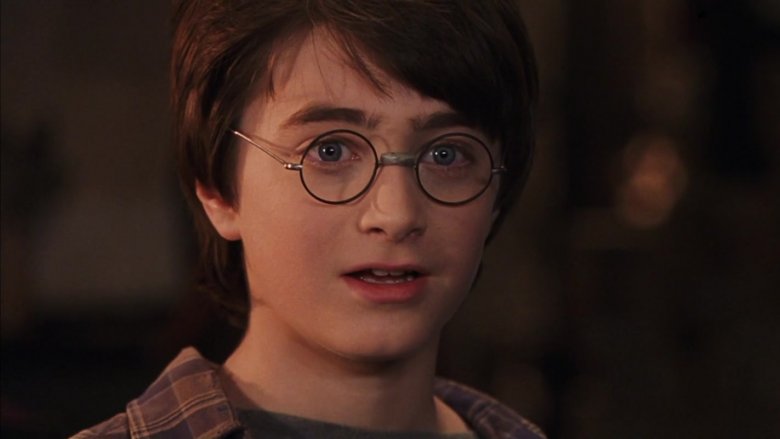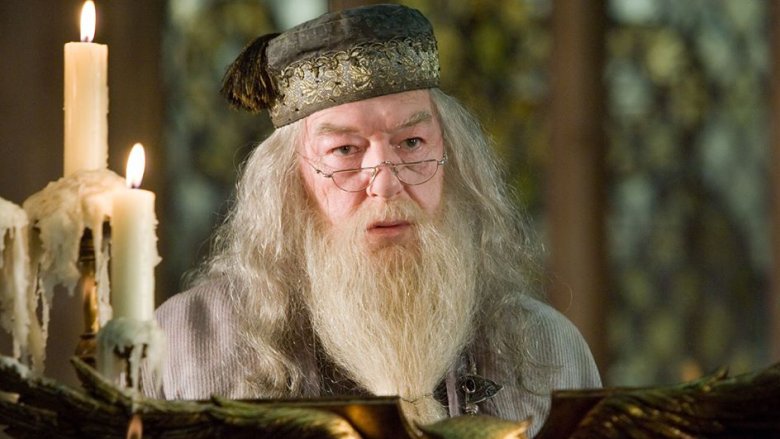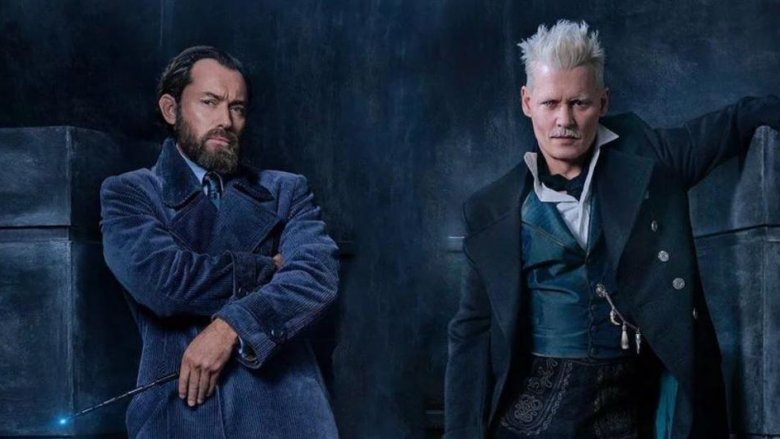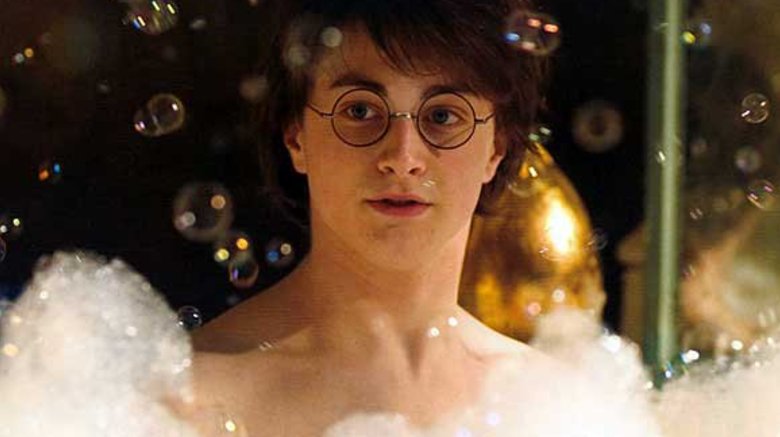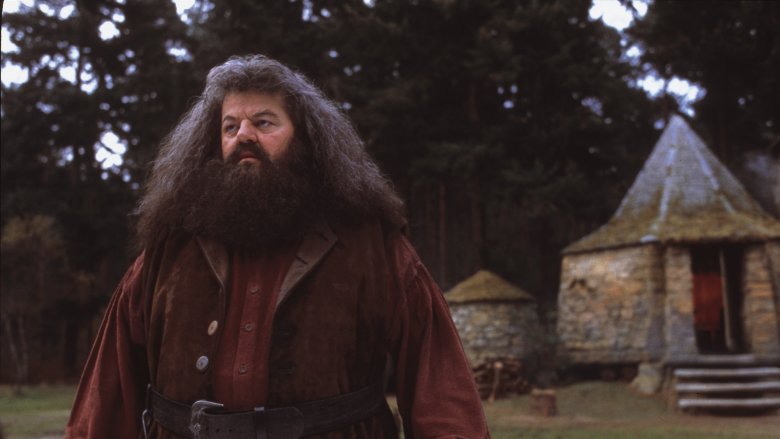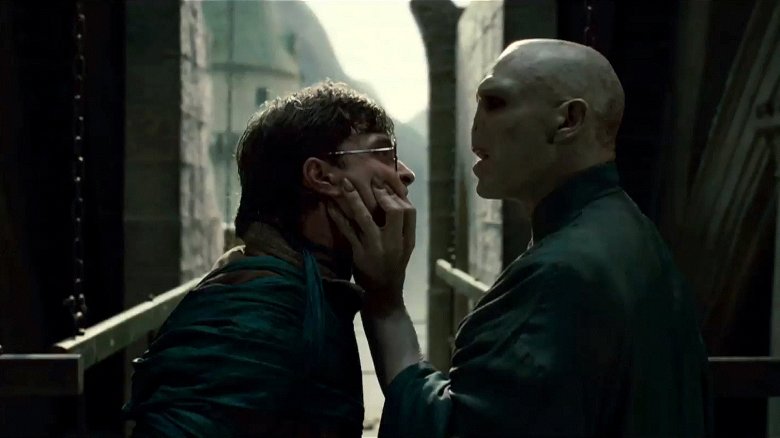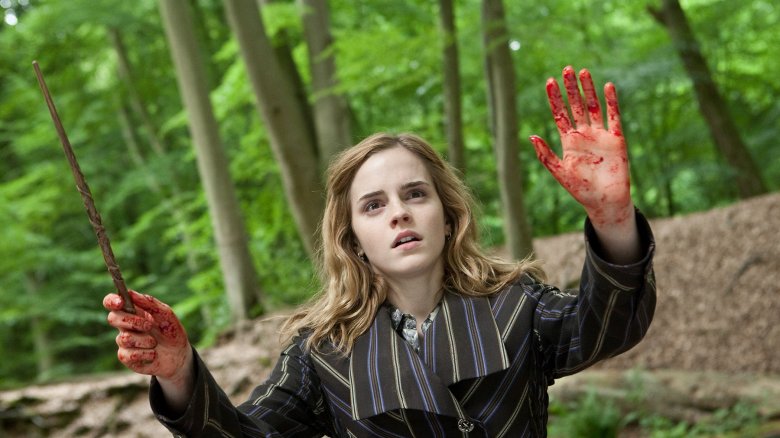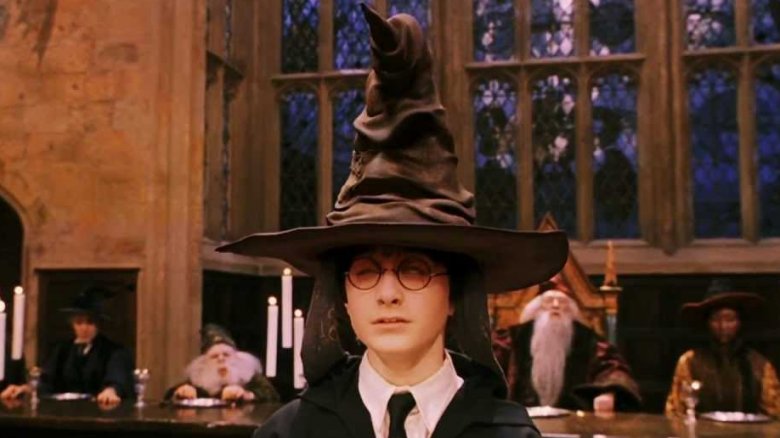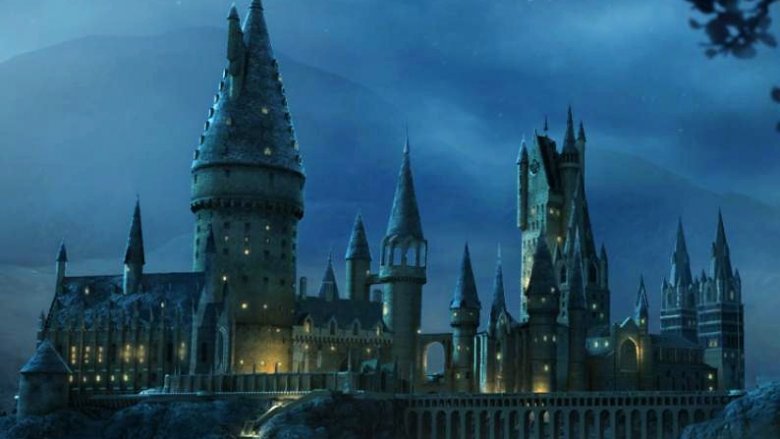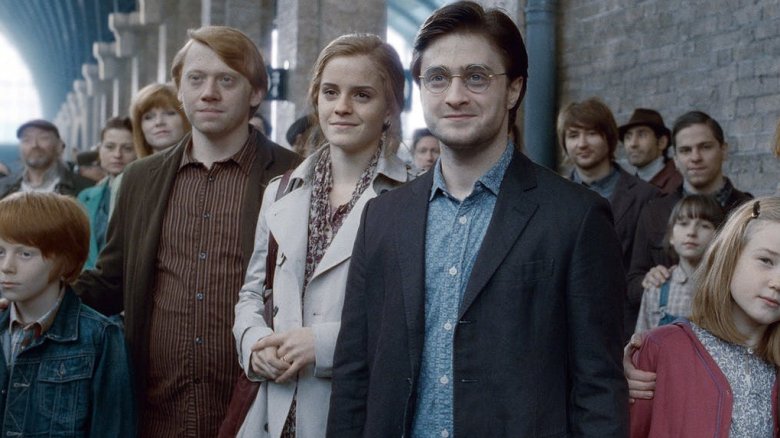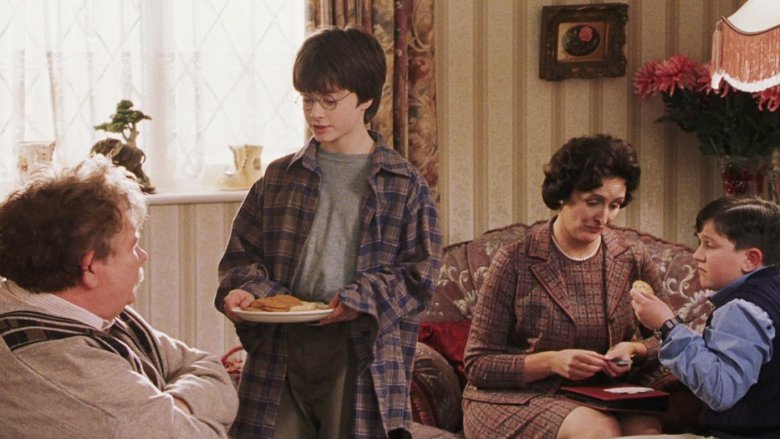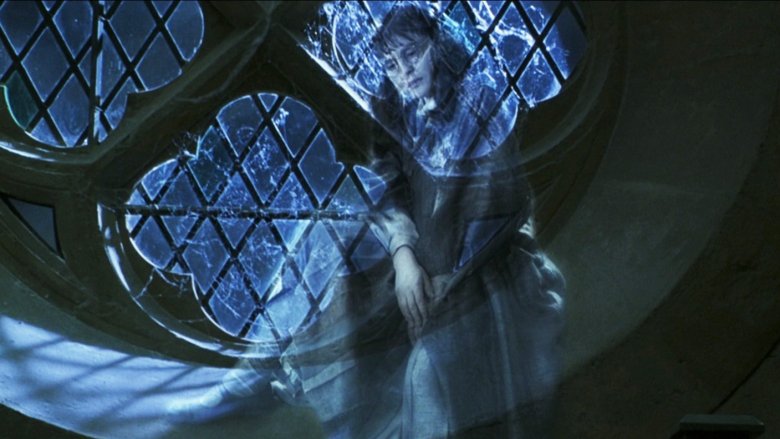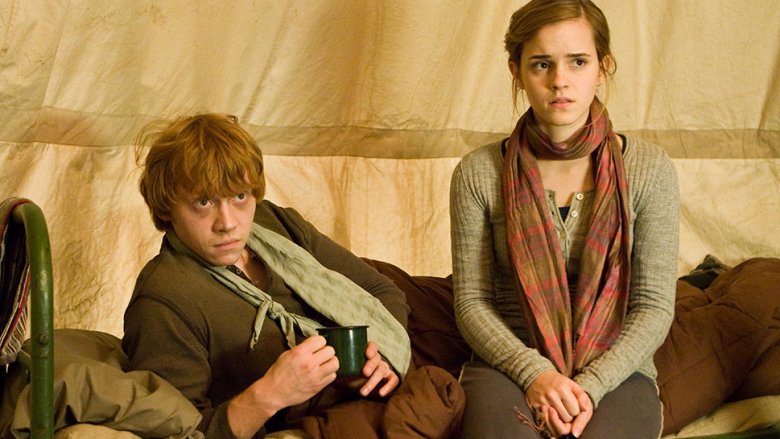J.K. Rowling's Biggest Harry Potter Revelations Since Finishing The Books
Ever since the first Harry Potter book was released in 1997, the wizarding world has become one of the biggest pop culture phenomenons of all time, spawning an enormous movie franchise, an award-winning Broadway show, theme parks, a studio tour, and more, letting the world of Harry Potter live on well beyond the original story's end. As fans of the franchise have aged into adulthood, it remains as popular as ever. With everything from tattoos to college Quidditch leagues, it definitely seems like die hard fans of the series want it to go on forever.
Apparently, J.K. Rowling agrees — even before launching Pottermore, a post-Potter encyclopedia that has provided fans with more fun facts about the world of their favorite characters, the writer revealed plenty about the world she created, occasionally stirring up controversy along the way. Here are the biggest revelations J.K. Rowling has shared with fans since finishing the books.
Dumbledore is gay
Any fantasy epic adhering to the "Hero's Journey" tradition must have a wizened, older wizard present to teach a young, naive protagonist how to overcome hurdles and challenges, and Harry Potter is no exception. Enter Albus Dumbledore, the headmaster of Hogwarts School of Witchcraft and Wizardry, who begins the series watching over the orphaned infant Harry from a distance, eventually becoming a major parental figure to during their shared time at Hogwarts. Even after Dumbledore dies in Half Blood Prince, his shadow looms large all the way through the final moments of the series.
There's plenty Harry doesn't know about Dumbledore, but one particular fact about him couldn't be gleaned by readers at all. In 2007, Rowling revealed that Dumbledore was gay, and though readers knew he had a close friendship with the wizard Grindelwald in his younger days, most didn't take that to mean that the two were more than friends. Though it makes sense that a teacher might not share his sexual orientation with his students, this was still quite the surprise for fans, who could now look at Dumbledore in an entirely new light. Rowling even claims to have clued in one of the films' screenwriters, nixing a would-be Dumbledore line about an old (female) flame.
Dumbledore and Grindelwald had an "intense" relationship
After dropping the big bombshell about Dumbledore's sexuality, Rowling waited nearly ten years to push the issue again, ahead of the first film in the Potter spin-off series Fantastic Beasts and Where to Find Them. These prequels feature a young Dumbledore (Jude Law) and Grindelwald (Johnny Depp).
Both Rowling and director, David Yates (who also helmed several installments of the original series), faced serious backlash over comments made by Yates stating that Dumbledore's sexuality wouldn't be directly addressed in The Crimes of Grindelwald, despite the fact that the antagonist of the film was famously Dumbledore's lover. Rowling followed up the controversy by announcing, on the Blu-ray release of the film, that the two had an extremely intense sexual relationship, perhaps trying to appease fans who understandably wanted Dumbledore to serve as an inspiring example of a gay character in pop culture.
Naturally, the comments sparked plenty of tweets and memes, but it also raised some important questions about representation — what does it say to LGBTQ+ fans that Dumbledore fell in love with a murderous villain and then possibly lived in celibacy for the remainder of his life? Certainly, there's still time for Rowling to announce that Dumbledore carried on a torrid affair with Kingsley Shacklebolt, but in the meantime, this particular fact sends a more muddled and confusing message than Rowling likely intended.
Wizards vanished their waste
There are still plenty of lingering questions about the wizarding world — everything from how many students really attend Hogwarts to why wizards never seem to take math classes — but there are also questions literally nobody wanted answered. Despite bathrooms playing a significant role in the series (particularly in Chamber of Secrets, where the entrance to the titular chamber is found in a ladies' room), fans really didn't have questions about how wizards got along pre-plumbing. Even so, Rowling was on hand to clear that one up.
In early 2019, a tweet from Pottermore, which Rowling uses as a space to constantly update fans on everything from wand lore to Minerva McGonagall's backstory, revealed a pretty unexpected fact about the wizarding world: before wizards began using Muggle-style plumbing, they basically just pooped right on the floor and then got rid of it using a vanishing spell. This brings up any number of disturbing questions, especially since the tweet also reveals that wizards didn't start using plumbing until the eighteenth century, meaning they experienced centuries of floor feces before adopting Muggle pipes. Presumably, wizards then had to "potty-train" themselves once they got toilets.
Though this fact could also be found buried in a 2015 Pottermore essay about how installing plumbing in one particular bathroom nearly revealed the Chamber of Secrets to the world, it caused much more of a stir in 2019, with fans wondering why it even needed to be said.
Hagrid doesn't have a Patronus
One of the most fascinating pieces of magic in the entire wizarding world is the Patronus Charm, a difficult and advanced spell which summons a magical protector that seems to be a part of a wizard's essential spirit. Harry first discovers his Patronus in Prisoner of Azkaban, and the subsequent detail that it takes the form of a stag to represent his late father James (an Animagus who could transform into a stag) is one of the series' most emotional moments.
As such, after the story officially ended, fans wanted to know about the Patronuses of their favorite characters, from Hermione's otter to Luna Lovegood's rabbit, but one revelation about a beloved character was particularly tragic. When asked what Patronus might belong to Rubeus Hagrid, the groundskeeper at Hogwarts who is one of the most loving and generous characters in the entire series, Rowling responded that Hagrid wasn't able to produce the very difficult spell, likely thanks to his (wrongful) expulsion from Hogwarts as a teenager. This wasn't the only tragic revelation — Rowling also noted that Severus Snape was the only Death Eater who could ever have a Patronus (which took the form of a doe to represent his lost love, Lily Potter), since he was the only member of the evil group with his soul intact.
Everyone has been saying "Voldemort" wrong this whole time
Every long-running series needs an iconic villain, and Voldemort certainly fit the bill for Harry Potter. After trying to kill Harry as an infant and nearly perishing himself, Voldemort spends the rest of his life on a mission to defeat Harry once and for all, with Harry escaping Voldemort's clutches time and time again as the body count continues to climb. When Harry finds out in Order of the Phoenix, about a prophecy which dictates that "neither can live while the other survives," he realizes that he cannot avoid his fate. After searching for Voldemort's Horcruxes (fragments of his soul placed in magical objects which prevent him from dying while they survive) and sacrificing himself to defeat the evil wizard, Harry is finally able to best Voldemort once and for all, taking down one of the most nefarious and murderous wizards the world had ever seen.
Voldemort's name itself is anathema to most wizards, who prefer to call him "He-Who-Must-Not-Be-Named" or "You-Know-Who" out of sheer fear, but as it turns out, even those bold enough to speak it have been in the wrong for years. In 2015, Rowling revealed she always meant Voldemort to be pronounced in the French fashion with a silent T, since the name itself means "flight of death" (referring to the wizard's fear of death). Everyone from fans to the films themselves got it totally wrong.
Hermione committed a wizarding crime in Deathly Hallows
Hermione Granger has served as an inspiration to brilliant and bookish children since her introduction in Sorcerer's Stone. Though she initially comes off as a frustrating know-it-all to Harry and Ron, Hermione is one of the series' most virtuous and beloved characters. Without her, the two boys would likely have ended up dead (or worse, expelled) before too long. Heralded as the brightest witch of her age, Hermione's love of learning, along with her quick thinking and magical prowess, set her apart from other students, even earning her a valuable and powerful Time-Turner in her third year at Hogwarts (of course, she only wanted to travel through time to do more homework).
Hermione's ingenuity serves the trio particularly well in Deathly Hallows, when she secretly packs all of their most valuable belongings (including the world's only true Cloak of Invisibility) into a tiny beaded evening bag, which she has bewitched to hold an enormous amount of objects. Though this magical object proves crucial in the final push to defeat Voldemort, it turns out that Hermione actually broke wizarding law, although she was never taken to task for it. Considering that, according to Harry Potter and the Cursed Child, Hermione actually becomes the Minister of Magic, this infraction clearly didn't hold her back very much.
The concept of a "Hatstall"
Even after the series ended, the concept of sorting has played a big role in a post-Potter world, with everyone from fans to celebrities getting sorted into the four personality-based houses of Hogwarts. Whether you're a brave Gryffindor, a hardworking Hufflepuff, a brilliant Ravenclaw, or a cunning Slytherin, most fans know which house they identify with the most. When Pottermore debuted in 2011, it featured the first ever definitive sorting quiz (written by Rowling herself), allowing fans to finally discover the answer about their houses.
For plenty of fans and characters alike, sorting is fairly straightforward. Still, Rowling used Pottermore to reveal the concept of a "Hatstall," meaning a person who shares traits that fit into multiple houses and causes the seemingly omniscient Sorting Hat to get stuck on where to place them for more than five minutes.
Even though the hat struggled with Harry, nearly placing him in Slytherin, Harry isn't a Hatstall. Hermione nearly was, as the hat struggled to choose between Gryffindor and Ravenclaw. His classmate Neville Longbottom's long sorting process was due to a fight between Neville and the hat over whether or not he was brave enough for Gryffindor (spoiler alert: he was). As it turned out, Harry actually did know two Hatstalls — his Transfiguration professor Minerva McGonagall and his parents' personal Judas, Peter Pettigrew. Both ended up in Gryffindor after nearly ending up in Ravenclaw and Slytherin, respectively.
Other wizarding schools exist
Even though two other wizarding schools, Beauxbatons and Durmstrang (located in France and Scandinavia, respectively) were introduced in Goblet of Fire during the Triwizard Tournament, fans kept wondering about other wizarding schools — particularly ones in America. With so many North American fans of the series and so few details about wizarding education in the States, fans were left high and dry on the subject for a number of years, until Fantastic Beasts and Where to Find Them shifted the focus across the pond.
In the lead-up to the film's release, Rowling revealed that the main school in North America is called Ilvermorny, which comes with its own distinct Houses and Sorting Ceremony. Rather than using a hat to sort new students, Ilvermorny is home to magical mascots representing each house, which work with the student to help choose their path. These houses, rather than being named for the founders of the school as at Hogwarts, are named for magical creatures, including Thunderbirds, Pukwudgies, Horned Serpents, and Wampuses. Each represents a different personality type, from adventurers (Thunderbirds) and healers (Pukwudgies) to scholars (Horned Serpents) and warriors (Wampuses). With plenty of information about Ilvermorny, as well as its own sorting quiz, North American fans could rest easy knowing they have a wizarding school of their own.
Younger wizards & witches are home schooled
There are plenty of valid questions about Hogwarts itself — like why the school is so riddled with danger or why Herbology is mandatory — but one lingering question fans had for years centered on what students do before they enroll. Since students don't start at Hogwarts until they hit 11 years of age (with Muggle-born students receiving quite a shock upon the arrival of an owl at their door with an acceptance letter), many fans wondered what young children did before their seven-year schooling career began.
In an interview with Time after the book series came to a close, Rowling answered several standing questions about the books, including what Dumbledore's wand was made out of and who Draco Malfoy ended up marrying. One revelation cleared up questions about wizarding elementary schools — Rowling noted that young wizarding children are homeschooled, since many younger witches and wizards have trouble controlling their magic and must be kept at home so they don't reveal themselves to Muggles by mistake.
Why the Dursleys hated Harry so much
Before Harry learns that he's a wizard and starts attending Hogwarts, he spends 11 miserable years with his aunt and uncle, Vernon and Petunia Dursley, and their awful son, Dudley. They all despise Harry and treat him terribly, even forcing the orphan to sleep in a spider-ridden cupboard under the stairs. It is later revealed that Petunia was jealous of her sister's magical ability, despite frequently calling Lily a "freak." Her detestable husband Vernon is equally incensed by the magical world, with the two of them swearing that they'll never let Harry be a wizard... until Hogwarts eventually intervenes.
Even with the specter of magic hanging over them, it's still a bit baffling that Vernon and Petunia would be so angry and resentful to a small child. Rowling eventually revealed that issues between the Dursleys and the Potters went all the way back to a date gone wrong, where James couldn't help but antagonize the Dursleys to the point of no return. As he grows up, Harry's eventual resemblance to his father infuriates Vernon in particular. Mix that with a fan theory that the Horcrux residing inside of Harry brought unintentional doom and gloom upon the Dursleys, and it's kind of no wonder they were a bit angry, even though they clearly took it too far.
Moaning Myrtle shares a name with an American politician... kind of
One of the oddest and quirkiest figures that lives in Hogwarts has to be Moaning Myrtle, the ghost of a young girl killed by the basilisk that resides in the Chamber of Secrets. Clearly, Myrtle has trouble letting go, since she haunts the very bathroom where she died (and where the entrance to the Chamber is hidden). From tormenting her old school bully for years to just wreaking havoc and constantly crying in the bathroom, Myrtle is one of the school's least beloved ghosts. Harry, Ron, and Hermione end up crossing paths with her plenty of times, from her inappropriately interrupting Harry's bath to her taunting Hermione over a Polyjuice Potion mishap.
At some point, Rowling decided to reveal Myrtle's full name, previously unknown to readers, presumably as a kindness (not even a fictional character would want to be known exclusively as "moaning" anything). Taking to Twitter, the author announced that Myrtle's name is actually Myrtle Elizabeth Warren, though she was quick to disavow any relation between Hogwarts' weirdest ghost and the accomplished American senator.
Rowling regrets Ron & Hermione's relationship
Throughout the book series, diehard fans had constant arguments about Hermione's love life, hotly debating whether or not she should end up with Harry or Ron. Though both sides presented plenty of evidence, throughout the later books in the series, it became relatively clear which direction Rowling was leaning. In the end, she paired Hermione with Ron, capitalizing on their years of tension and differences. Harry, meanwhile, ended up with Ginny, Ron's feisty and talented younger sister.
However, Rowling has since changed course, saying she wished Hermione had ended up with Harry after all. She claimed that the relationship between Ron and Hermione was simply a form of "wish fulfillment" for her, vindicating some fans while infuriating others. For fans who loved the fiery, intense relationship between Ron and Hermione (while Harry, for his part, describes Hermione as "like a sister" in Deathly Hallows), this felt like a total betrayal by Rowling, and left a bad taste in the mouths of many readers who had carefully tracked this love story throughout the books. To date, this revelation is still one of the most famous examples of a moment where fans simply wish Rowling would keep these feelings to herself.
